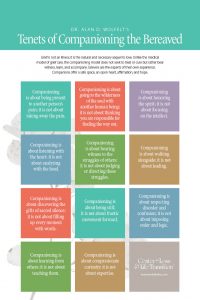By Alan D. Wolfelt, Ph.D.
“Real understanding is a creative mixture of certainty and unknowing. The trick is to know when you don’t understand.” ~ Thomas Moore
Curiosity for the companion is about being willing to enter into and learn about the mystery of grief while recognizing you do not and cannot fully understand someone else’s experience. Curiosity is bathed in an attitude that Zen calls the “beginner’s mind” or the “know-nothing mind.”
This attitude is not ignorance but the capacity to see without assumptions, to take a fresh look each and every time you are privileged to walk with and learn from a mourner. It involves a clearing away of thoughts, beliefs and ideas that might cloud your ability to see things as they are in pristine form.

Children are naturally curious. As we grow up we are at risk for losing this state of heightened awareness and natural desire to learn from those around us. We may falsely assume we already know. In other words, our intellect takes over. Yet, being a companion to people in grief can reactivate our sense of miracle to bring a fresh, simple, unsophisticated view of things.
YOU DON’T KNOW
Paradoxically, you can only learn from the mourner by acknowledging you don’t know. It is out of your helplessness that you ultimately become helpful. You have to be willing to disconnect from believing you have superior expertise of another human being’s emotional-spiritual journey of grief.
Through no fault of your own, your training as a caregiver may make it difficult to admit you don’t know and don’t have answers. You may instinctively be frightened to be present to people that are in liminal space – betwixt and between!

Actually, you may have been taught that part of being a professional is to project confidence and to state opinions as if they were gospel. You don’t get respected in this culture by admitting you are confused or by asking tentative questions in search of enhancing your empathy versus providing techniques for brief therapy that collaborates with managed care. The unconscious contamination of your training is more likely to encourage you to assess, diagnose and treat than it is to observe, witness, listen, learn and watch out for the mourner.
For some caregivers it is difficult – if not impossible – to relinquish their diagnostic categories, interventions and treatments. These terms often lie at the heart of the professional identity of the caregiver and the attempt to be part of the medical model of expertise. Yet, the companion humbly acknowledges that “compassionate curiosity” is what you really need to care for the mourner.
For some caregivers it is difficult – if not impossible – to relinquish their diagnostic categories, interventions and treatments. These terms often lie at the heart of the professional identity of the caregiver and the attempt to be part of the medical model of expertise. Yet, the companion humbly acknowledges that “compassionate curiosity” is what you really need to care for the mourner.
You have the honor as a companion to listen and to learn, to be curious rather than to be certain. The greatest privilege of the companioning model, in fact, is that it moves you closer to the very people you wish to support. When you listen without a need to judge or interpret, you create a safe place and become a safe person for the mourner.
At the end, it is not differences that divide us. Instead, it is our judgments about each other that do. Curiosity and use of the “teach me” model bring us back together. To use this model invites us to rest in the sometimes uncomfortable place of uncertainty – not knowing, having the answer or being the expert. Companioning invites you to pay attention to the soul work and the spirit work – and to be led rather than to lead.
THE MYTH OF THE EXPERT
Today, more and more caregivers are seeking certification as grief educators, counsellors and therapists. My own Center for Loss and Life Transition offers a certificate in death and grief studies. Yet I want to be clear that the receiving of this certificate following 150 hours of reflection on the mystery of death and grief doesn’t make the recipient an expert. Actually, it means the person has been willing to ponder the mysteries and be curious when learning from the true expert – the mourner! To be perceived, or worse yet, to perceive oneself as an expert grief counsellor may be the first step toward unbecoming a creative companion.
A Buddhist teaching notes, “In the beginner’s mind there are many possibilities; in the expert’s mind there are few.” One astute observer of this reality was Bradford Keeney, who wrote the following about the hazards of being an expert or master counsellor: “You will find that it no longer matters what you say. Everything uttered will be contextualized as the voice of a master…. Avoid the political posturings of ‘mastery’ and return to embracing and cultivating a beginner’s mind. Maintain and respect ignorance. Speak to hear the surprise from your own voice.”
As you contemplate the value of curiosity versus expertise, listen to your own inner voice. What has your own personal grief taught you about what helps people heal? Have you witnessed change as the journey unfolds, but not according to plan or as a consequence of intentional intervention? Do you appreciate the mystery of grief and challenge the wish to have it resolved (which it can never be)? Do you believe that caring for the mourner requires a different language than that of modern academic psychology? Depending on your answers, you may have to admit you are a responsible rebel who believes in compassionate curiosity and challenges ego-based expertise.
I believe that every counsellor must work to develop his or her own theory or point of view about what helps bereaved people heal. Challenging yourself to explain what happens in your counselling relationships with bereaved people and families will, in my experience, assist you in understanding and improving of the work you do to assist those you desire to companion.
TenetsofCompanioning_24x36To download this poster, click here: TenetsofCompanioning_24x36
CLICK HERE TO JOIN AFTERTALK
Free, Non-Profit and Non-denominational
Every Wednesday we will be publishing Pandemic Weekly for, we hope, not too long. We invite you to submit your thoughts, essays, poems or songs. Please send to info@aftertalk.com. To see past Pandemic Weeklies, CLICK HERE

